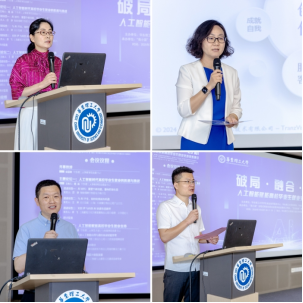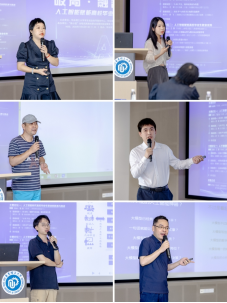Forum on AI-Enabled Construction of Employment Support System for Graduates is Successfully Held
2025-07-07
On July 5th, the "Breaking Dilemmas · Integration · Innovation: Forum on AI-Enabled Construction of Employment Support System for Graduates" was successfully held. The forum was co-hosted by the University's Student Career Guidance and Service Center, School of Business, and School of Art, Design and Media, and organized by the "Shang Xiaoyuan" Full-cycle Precision Career Development and Employment Service Studio and the "Yiqi Jiuye" Collaborative Career Planning and Employment Guidance Studio.

Prof. Hou Limin, Chair of the School Council; Associate Prof. Wang Shan, Chair of the School Council of the School of Art, Design and Media; Chen Qingsheng, Vice Chair of the University Council; Zheng Dong, Vice Chair of the University Council Student Work Department (Office) and Director of the Student Career Guidance and Service Center; Dr. Yao Lei, Vice Chair of the School Council; as well as experts from renowned enterprises such as Zhilian Recruitment, Zhuhai Wanda Commercial Management, Hangzhou Bank, Beijing Chuangjing, Huale Interactive Entertainment, and Shanghai Ziyuan Cultural and Creative, together with university employment workers, gathered to discuss the construction path of AI-enabled employment support systems for graduates.
In her opening speech, Prof. Hou Limin pointed out that with the rapid development of science and technology, the new generation of artificial intelligence technology is evolving rapidly, and university talent cultivation is facing unprecedented opportunities and challenges. She emphasized that this forum is an important opportunity for universities and enterprises to join hands and seek common development, aiming to gather wisdom from multiple parties, spark ideological collisions, and build a more precise, inclusive, and sustainable employment support system to help achieve high-quality full employment.
The forum set two core topics: "Opportunities and Challenges for Graduates' Employment in the AI Era" and "AI Empowering Employment Support for Graduates", which were hosted by Yao Lei and Wang Shan respectively.
In the first sub-forum, Shao Jing, East China Regional Marketing Director of Zhilian Recruitment, analyzed the impact of artificial intelligence on the workplace ecology from four aspects: organization, culture, growth, and motivation, and discussed the future talent capability framework and the evolution trend of work scenarios. Wang Lin, Product Director of Huale Interactive Entertainment (Shanghai) Technology Co., Ltd., combined with corporate practices, explored how graduates can turn challenges into opportunities and achieve coexistence with AI. Xue Fei, General Manager and Cultural and Creative Broker of Shanghai Ziyuan Cultural and Creative Development Co., Ltd., demonstrated the innovative application of AI in the field of cultural and creative industries, and pointed out that universities should cultivate compound interdisciplinary talents to meet the needs of future industrial development.

In the second sub-forum, Duan Kaiyang, Recruitment Manager of the Human Resources Department of Shanghai Urban Company of Zhuhai Wanda Commercial Management, discussed the application scenarios of artificial intelligence in enterprises and how to empower graduates' employment from the perspective of traditional industries. Cai Qingfeng, Director of University Solutions of Beijing Chuangjing Digital Technology Co., Ltd., introduced in detail the functions and applications of the AI Student Career Assistant, which provides students with precise career planning suggestions through personalized, generative, and companion services. Xu Weidong, Chief Expert of Artificial Intelligence and Large Model Application Construction at Hangzhou Bank, analyzed how enterprises can navigate the wave of large models from the aspects of theoretical logic and working mechanism.
Finally, in his concluding speech, Zheng Dong emphasized that doing a good job in college graduates' employment is a focus of the whole society. Artificial intelligence is both an opportunity and a challenge. He stated that universities, enterprises, and all sectors of society should work together to improve students' career planning ability and lifelong learning ability, and jointly build an inclusive and sustainable employment ecology.
The successful holding of this forum has built a bridge for school-enterprise cooperation and provided valuable theoretical guidance and practical paths for the construction of an AI-enabled employment support system in universities.
In the future, the School will always uphold the "iBEST" education concept, continue to promote the construction of the "Shang Xiaoyuan" Full-cycle Precision Career Development and Employment Service Studio (Shanghai Demonstration Site), further deepen the school-enterprise collaborative education mechanism, strengthen career planning education and students' internship practice, and provide more precise and efficient employment support and guarantee for graduates.
